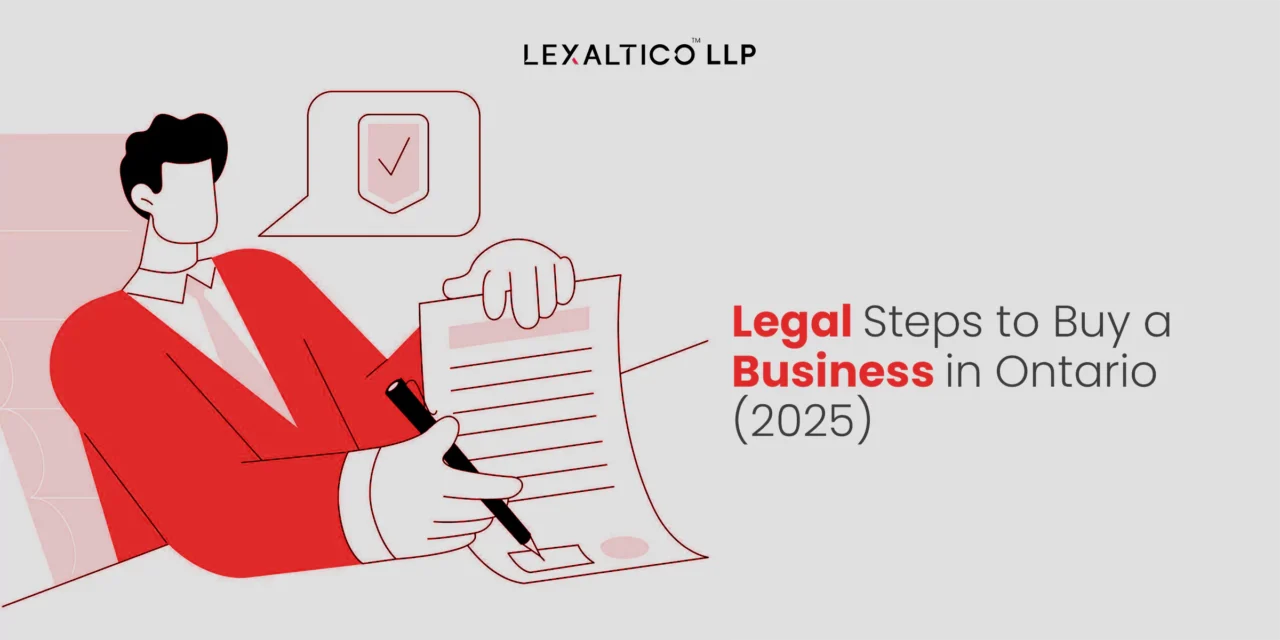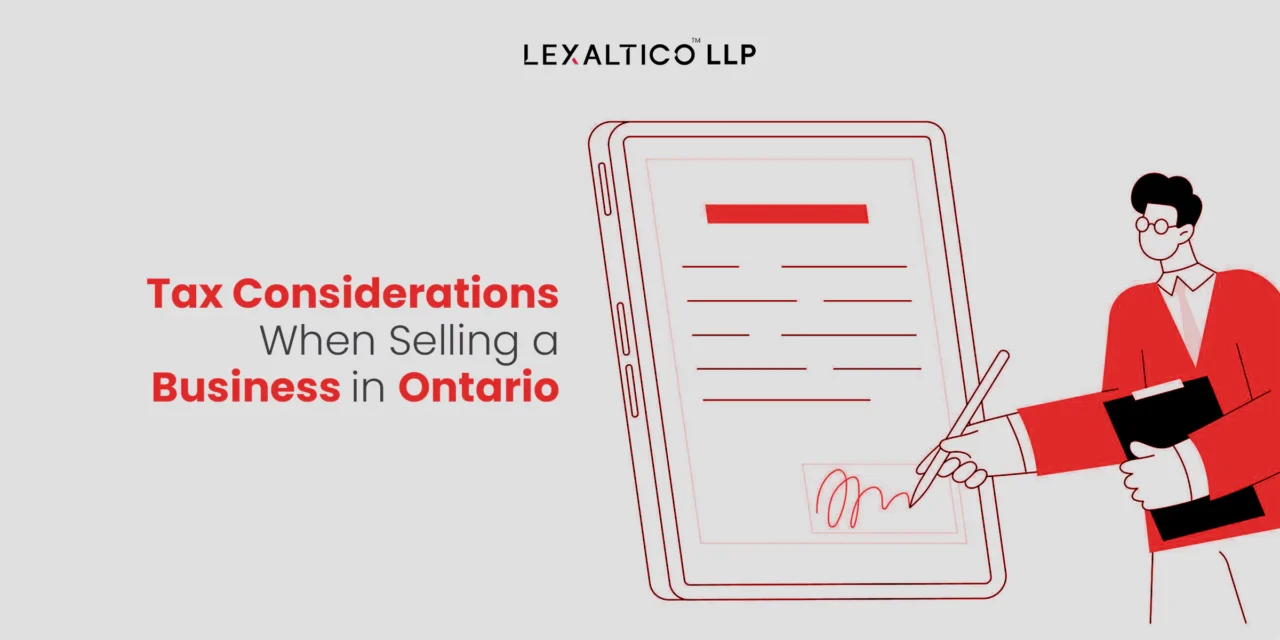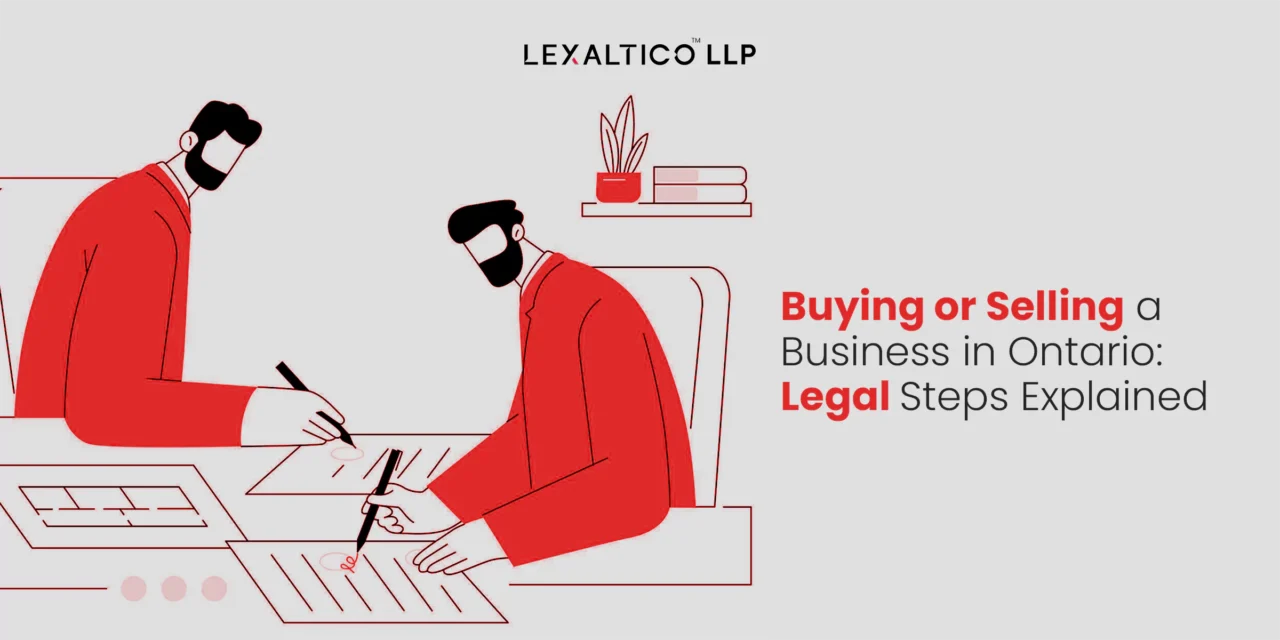Buying or selling a business in Ontario is a major decision that comes with legal, financial, and tax responsibilities. Whether you’re buying a business in Ontario or selling one, understanding the legal steps involved can help you avoid costly mistakes.
This guide breaks it down using plain language so you can feel confident in the process.
Legal Steps to Buy a Business in Ontario (2025)

When considering how to buy a business in Ontario, you typically have two main options: start a business from scratch or purchase an existing one. Buying an existing business has advantages, such as acquiring a proven model, customer base, and assets, but it also comes with legal complexities.
1. Decide on Structure: Asset Sale vs Share Sale in Ontario
One of the most important decisions is whether to buy the business through an asset purchase agreement or a share purchase agreement.
Asset Sale
In an asset sale, the buyer acquires selected business assets, equipment, inventory, intellectual property, etc.
The benefit? The buyer can avoid taking on unwanted liabilities.
However, as per CRA guidance:
- You will need to allocate the purchase price among different assets.
- If individual prices are listed in the business purchase agreement in Ontario, you can use these to calculate your capital cost allowance (CCA).
- If not, you must assign fair market value (FMV) to each asset. The remaining amount becomes goodwill, which now falls under CCA Class 14.1 as of January 1, 2017.
Example:
If you purchase a business for $480,000 and the FMV of assets totals $440,000, the remaining $40,000 is attributed to goodwill.
Share Sale
In a share sale, the buyer acquires the corporation’s shares, inheriting all business liabilities. This can be more straightforward, requiring fewer third-party consents. However, the cost base of the assets doesn’t change, and the buyer assumes all past obligations.
A business lawyer in Ontario can help you weigh the risks and tax implications of both options
2. Drafting a Letter of Intent (LOI) in Ontario
After deciding on the type of sale, the buyer and seller typically sign a Letter of Intent (LOI). This document outlines:
- Purchase structure (asset or share sale)
- Proposed price
- Closing conditions
- Confidentiality agreement
- Timeline and exclusivity
This helps both parties start the due diligence process with shared expectations.
3. Due Diligence Before Buying a Business in Ontario: What to Review
This is the most detailed part of the process. The buyer should investigate:
- Incorporation documents
- Financial records and liabilities
- Employment agreements
- Licenses and permits
- Lease agreements
- Intellectual property
- Litigation history
This legal review ensures the buyer knows exactly what they’re getting.
4. Business Purchase & Sale Agreement in Ontario: Key Clauses
Once due diligence is done, the buyer and seller enter into a formal contract:
- Business Purchase Agreement Ontario (buyer)
- Business Sale Agreement Ontario (seller)
These contracts define:
- The purchase price and payment terms
- Allocation of assets or shares
- Representations and warranties
- Closing conditions
- Indemnification clauses
If you’re allocating assets (in an asset sale), use fair market values.
For example, if you buy a business for $480,000 and the FMV of assets is $440,000, then $40,000 goes to goodwill. Goodwill now falls under Class 14.1 for CCA, not as an eligible capital property. (CRA)
5. GST/HST When Buying or Selling a Business in Ontario
If 90% or more of the business’s assets are sold, the buyer and seller can file Form GST44 to avoid paying GST/HST on the sale. Conditions include:
- Both parties are GST/HST registrants
- The sale includes all or substantially all business assets
- Form GST44 must be filed before the buyer’s next return due date
Note: This election does not apply to services rendered post-sale, leases, or sales of real property to unregistered buyers.
Tax Considerations When Selling a Business in Ontario

If you’re selling a business in Ontario, be aware of the following:
Capital Gains Deduction
You may be eligible for the Lifetime Capital Gains Exemption (LCGE) if selling qualified small business corporation shares.
CCA Recapture or Terminal Loss
When assets are sold, you may face:
- Recapture if proceeds exceed the undepreciated value
- Terminal loss if the remaining value is unrecovered
CRA now treats goodwill and other intangibles as Class 14.1 depreciable property.
Finalizing the Sale: How to Transfer Business Ownership in Ontario
At this stage, legal and financial documents are signed and ownership is transferred:
- Share certificates or asset transfers completed
- Money and documents exchanged
- Employment agreements updated
- Licenses transferred
After-Sale Checklist for Business Sellers in Ontario
If you’re selling a business in Ontario, you’ll need to:
- Cancel your Business Number (BN) with the CRA
- Close payroll accounts if you had employees
- Deregister from GST/HST if applicable
- Notify CRA about the change of ownership
Summary: Legal Steps to Buy or Sell a Business in Ontario
| Step | Buyer | Seller |
|---|---|---|
| Choose Sale Type | Asset or Share | Confirm type and structure |
| LOI | Draft with terms | Review and agree |
| Due Diligence | Conduct a detailed review | Provide documents |
| Draft Agreement | Business Purchase Agreement | Business Sale Agreement |
| GST/HST Election | File Form GST44 if eligible | File jointly if conditions met |
| Closing | Transfer ownership and funds | Sign off and transition |
| Post-Closing | File CCA, update registrations | Cancel BN, payroll, GST/HST |
Final Thoughts: Hire a Business Lawyer in Ontario
The process of buying or selling a business in Ontario involves legal steps that must be taken seriously. From choosing between an asset or share deal to understanding the tax implications and filing the correct GST/HST forms, every step matters.
Work with a trusted business lawyer in Ontario to help you go through these steps, draft contracts, and ensure the transfer of business ownership goes smoothly.
Quick FAQs
The legal steps include drafting a letter of intent, conducting due diligence, choosing between an asset or share purchase, negotiating a business purchase agreement, and closing the transaction. You must also handle tax filings, regulatory approvals, and transfer of ownership documents.
Yes, a business lawyer is highly recommended to review contracts, ensure legal compliance, and protect your interests during the transaction. They also guide you through tax planning, corporate filings, and regulatory requirements.
In an asset sale, only selected business assets and liabilities are transferred, giving buyers more control over what they acquire. In a share sale, the buyer purchases the owner’s shares in the corporation and assumes all existing liabilities.
Key documents include the business sale agreement, financial statements, tax returns, employment contracts, asset or share transfer records, and CRA filings. You may also need a letter of intent, GST/HST election forms, and corporate resolutions.
It typically takes 30 to 90 days to close a business sale, depending on the deal’s complexity and the time required for due diligence and legal reviews. Delays can occur if third-party consents or regulatory approvals are needed.
A business purchase agreement includes the purchase price, list of assets or shares being transferred, representations and warranties, closing conditions, and any indemnity or holdback terms. It also covers tax treatment and the allocation of liabilities.
Due diligence involves reviewing financial records, corporate documents, contracts, licenses, legal liabilities, and employment agreements. This helps the buyer assess risks and validate the business’s financial and legal status before closing.
Sellers may face capital gains tax and possible recapture of depreciation (CCA), but may also qualify for the Lifetime Capital Gains Exemption on shares of a qualified small business. GST/HST may be avoided if both parties elect under CRA Form GST44.
Yes, if you buy the business through an asset sale, you can choose not to assume the seller’s debts. However, in a share sale, you inherit the company’s liabilities unless otherwise negotiated.
A letter of intent should outline the purchase price, structure (asset or share deal), confidentiality terms, due diligence timelines, and key conditions for closing. It serves as a non-binding roadmap for negotiating the final agreement.
Disclaimer: The information provided in this blog is for general informational purposes only. It is not legal advice and should not be relied on as such.



